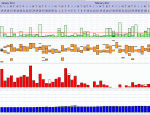napstress wrote:Interesting terms: "reverse nutrition" and "negative nutrition." Like a twisted way of being "malnourished."
...
Another puzzling aspect to my experience the other day was that I actually still felt hungry after eating the 2 McD's hamburgers and small fries, even though the meal amounted to 730 calories! When I eat two of my own hamburgers and a half-potato's worth of home-made hash browns in a small amount of olive oil, I feel satisfied. And without that McDonald's hangover.
...
My friends were baking Christmas cookies the other day and criticizing how, in their grandmother's day, lard was used for the recipes. They believe that Crisco shortening is an improvement over lard. This strikes me intuitively as incorrect. What say you all? In terms of calories, lard is only 10 calories more than the Crisco per Tablespoon. Lard has some cholesterol and Crisco has none, but it's not a great difference, and the whole cholesterol thing is bogus, anyway. It just means that lard comes from something that has feet and Crisco comes from a plant.
To me, malnutrition implies something like rickets or scurvy -- usually the absense of a single nutrient in famine situations or in small populations that temporarily don't have access to a regular food stuff for that culture. Sailors got scurvy because they didn't have access to fresh foods that had vitamin C. The term 'Limey' comes from the early British naval practice of making sailors eat limes on a regular basis to keep scurvy from manifesting.
In
this case, the entire food product has been so over processed, all real nutrition and enzymatic cues have been purposefully removed. The only thing that's left is starch and sugars. The tiny amount of lettuce and tomato are insignificant in their actual nutritional value. A slice of tomato and a lettuce leaf do not a salad make. Fructose is the sweetener used in all the non-diet beverages at McDonald's. As sweet as it is, fructose is a toxin that can only be remediated by the liver. Your liver deals with fructose the same way it deals with alcohol. While there are no noticeable
immediate effects of fructose on the body, chronic use has the same effect as alcohol - diabetes, liver failure, death, etc.
We feed this stuff to our kids thinking it's okay because we don't feel any different
now, but our bodies are working just as hard to get rid of fructose as they do to get rid of alcohol. If you tax the liver too much, too long, it's going to fail. McDonald's and most similar fast food places are culpable for creating foods that fill us, but leave us still feeling hungry. We crave more, so we eat more. We get fat, We get diabetes. We die. Since these consumable products actually
make us sick rather than fortify our bodies, they are in fact
reverse nutrition rather than mere malnutrition. We shouldn't call these consumables 'food'. Most of the 'snack-things' available in hermetically sealed pouches on the store shelves are similarly reverse nutrition and not food. My choice? I wouldn't let a kid eat at McDonald's, BK or any of these other places because they are nutritional graveyards.
There is nothing wrong with lard when consumed in its normal culturally-traditional food palette. I'm sorry to report -- cake with lard frosting is not part of any culturally traditional food palette. Cold-pressed vegetable oils are okay -- olive, coconut, walnut, peanut, sunflower, safflower, etc. These oils have been in traditional foods for ages.
But think about corn or rape-seed (canola) oil: they have to be heavily processed - basically heated and killed -- before they provide the oil, wrested very forcefully from huge amounts of the original plant material at great cost and little benefit to provide meager amounts of actual oil. These are negatively nutritious oils. Like fructose, these oils are on the GRAS list (Generally Recognized As Safe) only because they were on the market before the late 1950's. Market forces lobbied for them
not to be scientifically tested and won. So we have
no proof for or against the actual nutritive value of these substances because market economists don't want to be forced to remove any very lucrative crop or its over-processed products from the market if the products are found to be 'bad'. How many aisles in our grocery stores are filled with this stuff?
Further, I am convinced that there may be an addictive element to the modern junk food diet that is being shoved 'under the carpet' in the same way that market-unfavorable tobacco smoking research was scuttled for decades.
My wife suggests that you could have removed the buns and just eaten the patties for the protein. Considering the source (vast feed lots of corn-fed cattle), it's still debatable how much actual nutrition can be gotten from them.
In short - you better believe this stuff can affect your sleep. I don't know how it ties together, but our bodies are each an integrated ecosystem. When one organ begins to fail, the others try to rebalance and pick up the slack. With continued reverse nutrition, the other organs start failing too. Sleep will be somewhere in the cascade of cause and effect. I'm just not sure which side of the spectrum lack of sleep is closet too.
In the last decade or so, we are beginning to realize the tie between criminal behavior and our junk food habit.
http://www.smh.com.au/news/national/cri ... 39865.html

















